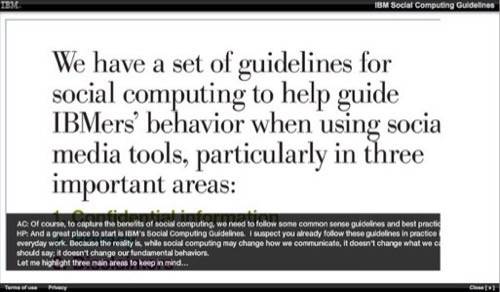Volvo IT has a policy against using its network to post racist and other defamatory information against individuals. But it is considerably less visible and not nearly as thorough as other corporate policies for posting information to the Internet, on blogs and social networks.

The Volvo IT policy is an Adobe PDF file that details pretty clearly what is deemed inappropriate.
Earlier this week, Wikipedia banned editing from machines inside the Volvo IT Department for racist remarks left on the pages of two well-known Pakistani Cricket players.
From Volvo IT’s policy:
“It is not allowed to use e-mail for sending or any other way of transmission for sending or receiving any information which is racist, obscene, offensive, threatening; or which includes harm to minors, hoaxes, malicious code, unwanted advertising, material intended to disturb other’s equipment, or which is sent in a way that includes breach of any person’s rights, copyright, privacy or other rights. It is not allowed to impersonate other users, to distribute pornographic material, to upload, download or distribute child pornography or illegal software. It is not allowed to send or facilitate unsolicited commercial email or bulk emails or to mail bomb, i.e. to intentionally try to impede another person’s use of e-mail services.”
Besides this, Volvo IT and the Volvo Group have not developed a detailed policy on best practices for using the Internet. There is no visible information for how employees use the Internet, best practices for blogging and how to conduct oneself on social networks. There is actually little on both sites to show any use of social technologies for its purposes.
In contrast, we looked at policies from larg organizations that do have policies. We believe more detailed policies provide the opportunity to better educate employees and can prevent incidents like what happened at Volvo IT.
Here are some policies that we found worth highlighting. Interestingly, microblogging has not filtered into these policies in much of any way.
Cisco Systems
Cisco is considered one of the most advanced users of social technologies. It is increasingly focused on enterprise collaboration technologies. Its policy on posting to the Internet is clearly written by the legal team. And it covers the bases.
“Your Internet posting should reflect your personal point of view, not necessarily the point of view of Cisco. Because you are legally responsible for your postings, you may be subject to liability if your posts are found defamatory, harassing, or in violation of any other applicable law. You may also be liable if you make postings which include confidential or copyrighted information (music, videos, text, etc.) belonging to third parties. All of the above mentioned postings are prohibited under this policy.
When posting your point of view, you should neither claim nor imply you are speaking on Cisco’s behalf, unless you are authorized in writing by your manager to do so.”
IBM
IMB provides a thorough guide to posting, embracing the concept of posting online but also being cognizant that an employee’s personal and professional life are now so intertwined. To help matters, IBM created a video for employees about practices to follow.

Intel
Intel may be the most enlightened in terms of how it views the way its employees interact online. We particularly find encouraging how the company proposes people engage in online conversations.
“Talk to your readers like you would talk to real people in professional situations. In other words, avoid overly pedantic or “composed” language. Don’t be afraid to bring in your own personality and say what’s on your mind. Consider content that’s open-ended and invites response. Encourage comments. You can also broaden the conversation by citing others who are blogging about the same topic and allowing your content to be shared or syndicated.”
Summary
Open policies like those employed by Intel may be the best defense when a rogue employee uses the Internet for nefarious purposes. The impacts can be blunted pretty fast as the conversation can be turned by the many people engaging online who are vested in the outcome. We expect policies like these will be increasingly importlant as more employees use the social web for their peronal and professional work.










